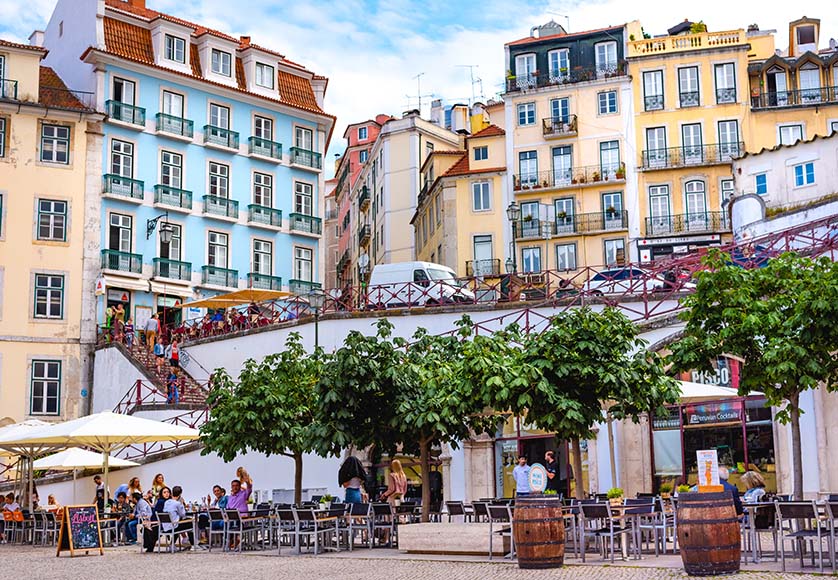Are you considering moving to Portugal? If so, please see below the various steps involved in order to establish legal residency:
Step one: Choosing the right visa type
The visa is the document that allows entry into Portugal, typically in the form of a stamp in your passport, and it enables you to stay in Portugal for a specific period of time.
The residence visa is a type of visa that allows its holder to enter Portugal to apply for a residence permit, in order to effectively live in Portugal. This visa is valid for two entries in the country and allows staying in Portugal for a period of four months, during which an application for a residence permit must be submitted.
Irrespective of the type of residency application that is chosen, the applicant is also entitled to apply for family reunification and bring along family members.
Some of the most popular visa options are:
D2 Visa: for Entrepreneur
The D2 Visa is appropriate for individuals who want to start a business in Portugal, set up a company or a startup. This visa is intended to raise foreign investment to develop the Portuguese economy.
D7 Visa: for people living from passive income or already retired
The D7 Visa is destined for people that are already retired or for those who live from passive income, such as rents, financial investments, and royalties. It is important to prove that the source of passive income is regular and stable, in a monthly amount never lower than the Portuguese minimum salary (currently €820,00).
D8 Visa: for Digital Nomads
The Digital Nomads Visa was introduced in 2022. Individuals who work remotely for entities based outside Portugal can apply, whether they are employees or independent workers. There is a salary requirement of a minimum of four times the Portuguese minimum salary.
Special regime: Golden Visa (investment)
The Golden Visa is the only type of residence visa that allows the applicant to live and work in Portugal, only having to spend, on average, seven days per annum in Portugal, so it does not trigger the need to change tax residency.
The Golden Visa framework was altered in 2023 to remove investments in the real estate sector. Currently, the investment amount ranges from €250,000 to €500,000 and there are several types of eligible investments, such as investment funds, a gift to the arts, setting up of a company or reinforcement of share capital in a Portuguese company, and the creation of jobs in Portugal. The requirements and minimum investment amount differ according to the type of investment.
Step two: Gathering the required documents
Before applying for a residence visa, it is necessary to request a Portuguese Tax Number (or NIF).
After obtaining the NIF, the applicant should open a bank account in Portugal, since all residence visas require showing sufficient means of subsistence, through a deposit in an amount equivalent to 12 times the Portuguese minimum salary in an account in Portugal.
In addition, the applicant must show proof of accommodation in Portugal, for no less than six months. Therefore, the applicant may purchase a property in Portugal and provide copy of the deed of purchase or sign a lease agreement.
It is also mandatory to present travel and medical insurance that covers Portugal, which must be valid for at least one year, as well as all specific documentation required, depending on the type of residence application that is chosen.
Step three: Applying for the visa
Once the applicant gathers all documentation, the process is initiated at the Portuguese consulate in the United States, with jurisdiction over the residence area (New York, San Francisco or Washington D.C.). The process starts by scheduling an appointment at VFS Global, a company that intermediates the process between the citizens and the consulate. VFS Global collects all the necessary documents and sends it onto the consulate, who analyze and decide upon the visa application.
Step four: Obtaining a residence permit in Portugal
Once the residence visa is issued, the applicant may travel to Portugal to apply for the residence permit. Most commonly, the visa will have information regarding the date of appointment at AIMA, the Portuguese Immigration Agency in Portugal. At AIMA, the applicant needs to present the required documentation as well as allow the collection of the biometric data for the residence card to then be issued.
The residence card is then issued, and is initially valid for two years, renewable for equal periods. After five years of legal residence, the applicant is entitled to apply for citizenship, provided they meet with other requirements, such as knowledge of the Portuguese language.
Step five: Changing the tax address to Portugal
Except in relation to the Golden Visa, in all other situations, once the residence card is issued, the applicant becomes a legal resident in Portugal. It is, therefore, necessary to also change the tax residency to Portugal. It is recommended to obtain tax advice both in the United States and in Portugal, to understand the consequences of changing the tax residency to a new country.
If you are considering moving to Portugal, our advice is to plan ahead of time and seek proper legal advice to ensure that you choose the type of visa that best suits your personal situation.
Lisbon: (+351) 217 981 030
Loulé: (+351) 289 143 189
(chamadas para a rede fixa nacional / calls to the national landline)
info@tpalaw.pt | www.tpalaw.pt
Sponsored content




















